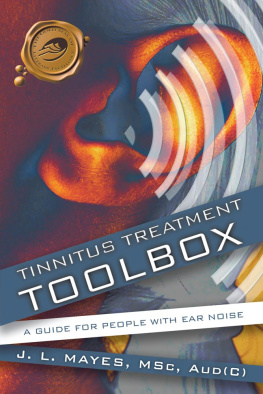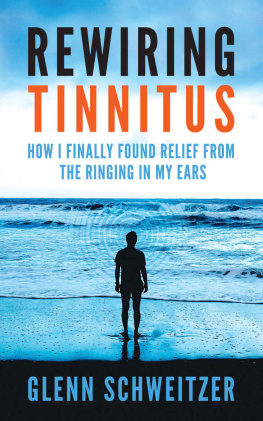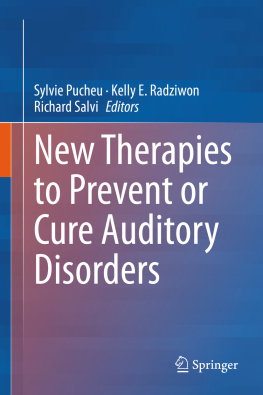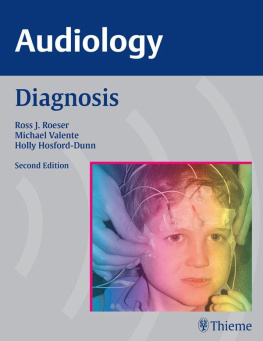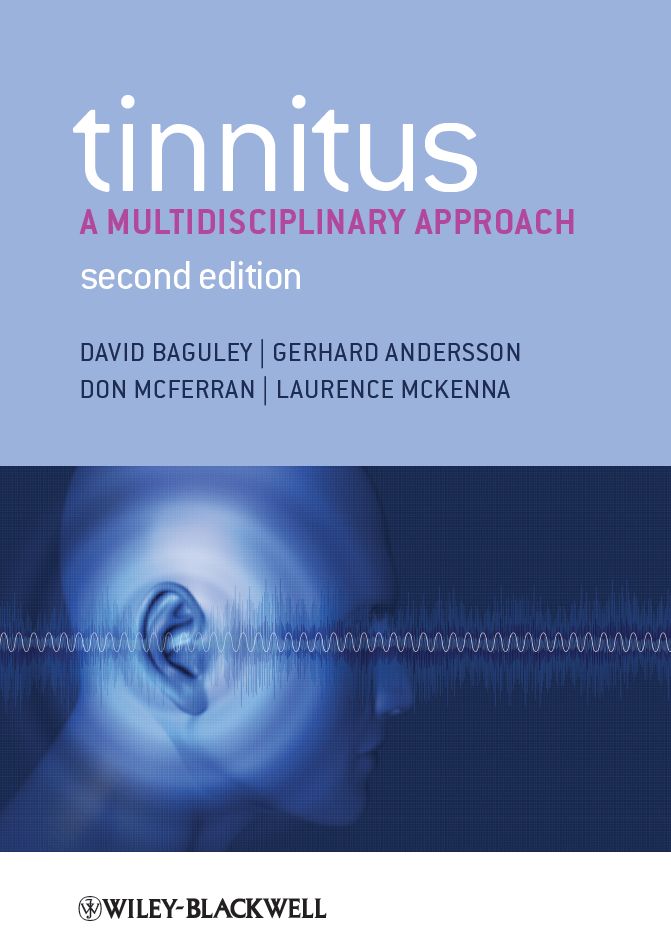
This second edition is dedicated with love to Sheila and
Bridget Baguley, Ebba, Edvin and Elsa Andersson,
Tanya McFerran and Anne OSullivan

This edition first published 2013 2013 by David Baguley, Gerhard Andersson, Don McFerran, Laurence McKenna
Blackwell Publishing was acquired by John Wiley & Sons in February 2007. Blackwells publishing program has been merged with Wileys global Scientific, Technical and Medical business to form Wiley-Blackwell.
RegisteredOffice
John Wiley & Sons, Ltd, The Atrium, Southern Gate, Chichester, West Sussex, PO19 8SQ, UK
EditorialOffices
9600 Garsington Road, Oxford, OX4 2DQ, UK
The Atrium, Southern Gate, Chichester, West Sussex, PO19 8SQ, UK
111 River Street, Hoboken, NJ 07030-5774, USA
For details of our global editorial offices, for customer services and for information about how to apply for permission to reuse the copyright material in this book please see our website at www.wiley.com/wiley-blackwell .
The right of the author to be identified as the author of this work has been asserted in accordance with the UK Copyright, Designs and Patents Act 1988.
All rights reserved. No part of this publication may be reproduced, stored in a retrieval system, or transmitted, in any form or by any means, electronic, mechanical, photocopying, recording or otherwise, except as permitted by the UK Copyright, Designs and Patents Act 1988, without the prior permission of the publisher.
Designations used by companies to distinguish their products are often claimed as trademarks. All brand names and product names used in this book are trade names, service marks, trademarks or registered trademarks of their respective owners. The publisher is not associated with any product or vendor mentioned in this book. This publication is designed to provide accurate and authoritative information in regard to the subject matter covered. It is sold on the understanding that the publisher is not engaged in rendering professional services. If professional advice or other expert assistance is required, the services of a competent professional should be sought.
Library of Congress Cataloging-in-Publication Data
Tinnitus : a multidisciplinary approach / David Baguley ... [et al.]. 2nd ed.
p. ; cm.
Includes bibliographical references and index.
ISBN 978-1-4051-9989-6 (pbk. : alk. paper)
I. Baguley, David (David M.)
[DNLM: 1. Tinnitus. WV 272]
617.8dc23
2012032714
A catalogue record for this book is available from the British Library.
Wiley also publishes its books in a variety of electronic formats. Some content that appears in print may not be available in electronic books.
Cover image: Fotolia/philhol
Cover design by Meaden Creative
Foreword
Clinicians and researchers who accept the challenge of helping patients suffering from tinnitus must be prepared to implement management strategies that are as varied and diverse as the population they serve. The notorious abundance of tinnitus cures suggests that there are (at least) as many tinnitus causes, triggers and mechanisms. It will probably always be the case that no one-size-fits-all approach to tinnitus management will succeed, but it is equally likely that a variety of interventions may, in many cases, produce some amelioration of the patients distress. Most researchers and practising clinicians report that a combination of sound therapy and counselling facilitates the patients ability to manage the tinnitus experience. Psychotropic agents produce mixed success from which we infer that, at a minimum, such drugs work well for some patients regardless of whether the influence is upon the tinnitus sound, the patients psychological health or both. Herbal supplements, vitamins and alternative therapies such as acupuncture, biofeedback and hyperbaric oxygen therapy have produced mixed results that must be weighed against the potential, and substantial, risks associated with their use. What is the practitioner who answers the call, and decides to work with tinnitus patients, to make of this situation?
The second edition of Tinnitus: A multidisciplinary approach promotes tinnitus management strategies built upon the collaborative care for suffering patients and the preparation of clinicians for such practice. We have a set of authors uniquely qualified to tackle thorny tinnitus problems, and it is clear that their work as clinicians and researchers has crystallised in the group the certainty that our patients more often than not require care that knows no borders. The centrepiece of this text is its dispensing of practical, evidence-based information from the fields of audiology, otology, psychology, psychiatry and auditory neuroscience. Tinnitus distress may derive from several different factors simultaneously, and the authors remind us to weigh the potential risks and benefits of action and inaction. Throughout, they provide thorough and current reviews of material germane not just to clinical practice but to the educating of individuals who will conduct the practice.
The reader will find resources that facilitate the essential task of interacting with patients and determining a tinnitus management plan. To address the likelihood that all tinnitus patients present unique challenges to the clinician, the authors provide guideposts, evidence and thoughtful rationales for selecting a course of action tailored to each patients needs. For example, some tinnitus programmes focus on modifying a patients concept of tinnitus and its effects, thereby facilitating a change in the patients behaviour and approach to the problem (i.e. Cognitive Behavioural Therapy). Others utilise particular protocol-driven therapy, specifying more consistent application of sound levels and specific counselling components (i.e. Tinnitus Retraining Therapy). Others (i.e. Neuromonics) couple sound or music filtered specifically to account for each patients hearing sensitivity and loudness tolerance to counselling that varies little across patients. The reviews of these and other management protocols are of great value not only to present practitioners but also to the student or professional who considers working with tinnitus patients.
It is admittedly difficult to report clinical success when the approach to patient management is idiosyncratic and driven more by the patients needs than by a cookbook plan of action. Particularly at this time, when clinical success is defined in the context of evidence-based practice, an eclectic approach to management of a potentially disabling condition may provide benefit to patients but may be difficult to sell to peer reviewers and other clinicians. Yet, when we observe improvements in our patients, it is undeniable, and when we measure a patients self-assessment of handicap, we may measure statistically significant changes in the patients tinnitus experience. While it is difficult to define precise tinnitus distress or tinnitus relief, clinicians working with tinnitus patients see their share of both.
A clinicians experience with suffering patients provides the impetus to adapt and adjust strategies in order to facilitate the patient managing the condition effectively. As the authors point out, some of these real time adjustments may lead to novel methods for use with other patients. However, the clinicians experience with tinnitus patients likely influences their willingness and ability to adapt clinical approaches with which they are comfortable. It is therefore important to gain, or help others achieve, the experience and confidence required to implement starkly different strategies for different patients. The authors have provided a rich inventory of management strategies that should foster a clinicians flexibility in order to meet the diverse needs and challenges associated with the tinnitus patient population.
Next page




